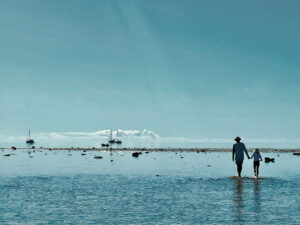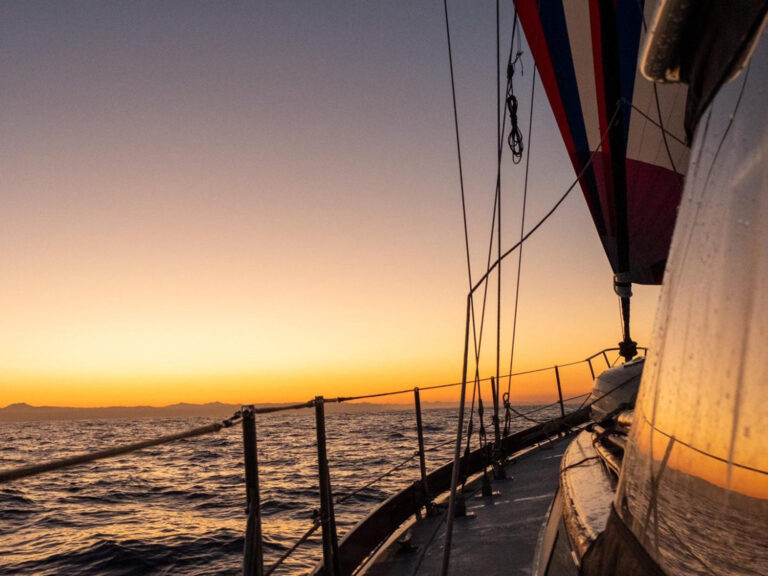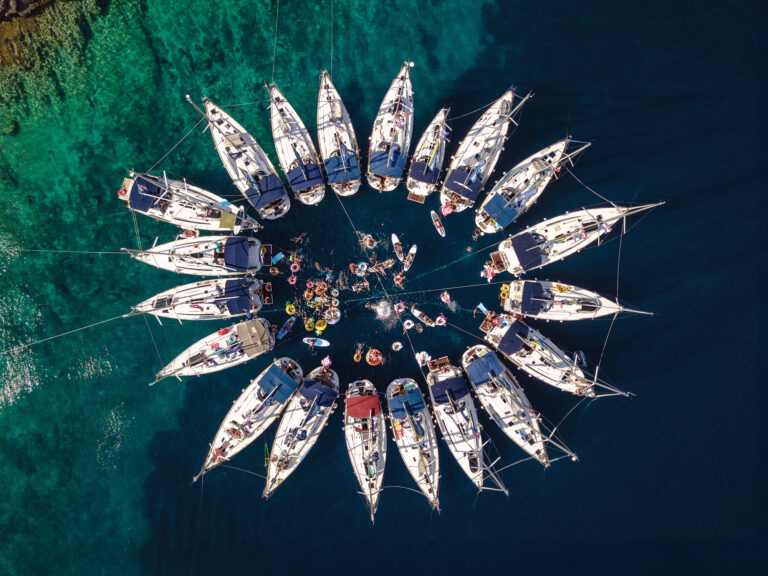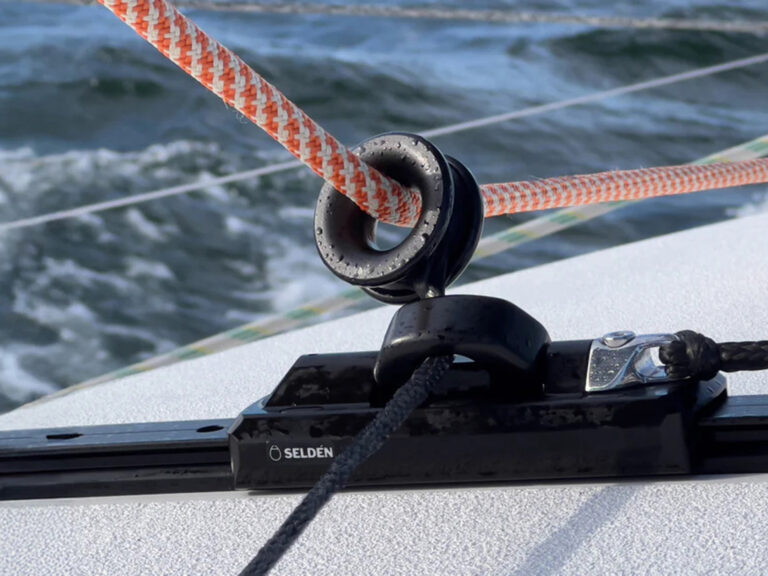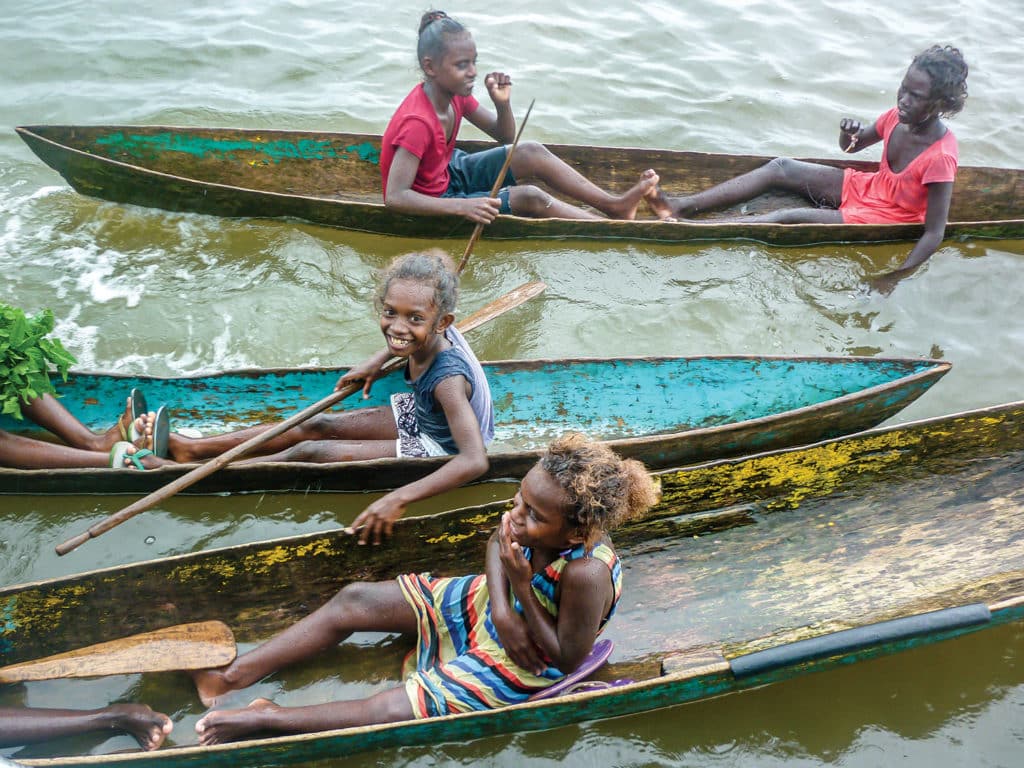
They arrive shortly after we throw the anchor in a wide, protected bay in the Western Province, Solomon Islands. The scout boat stands off, cautiously waiting for our cue. We wave and ask, “You got something?” Our inquiry is met with bright smiles and whispers as the two girls in the dugout canoe tentatively paddle closer. Once they finally reach the boat, the girl in the bow holds onto the toe rail, and there are more whispers and giggles. This shy stalemate could last forever, and so we ask again, “What you got?”
“Lemons!” they declare. They proceed to hold up a small plastic bag filled with limes, the words interchangeable here.
“Yes, we like. You want trade? You want money?”
“Lollies?” they respond.
They, like kids the world over, want candy. But unlike children from wealthy countries, these kids likely don’t have access to toothbrushes and toothpaste and oral-hygiene lessons. We’ve seen too many kids with outstretched hands and rotten teeth asking for lollipops. We never give out candy; we don’t even eat it ourselves.
“Mefella no got lollies (“We don’t have candy”),” I tell them. “Sugar tu mas, bad lo teeth. (“Too much sugar, bad for your teeth.”)”
They are crestfallen for a moment, and with the prospect of exotic candies squashed, they instead ask for money. The negotiations begin.
“How mas?” I inquire.
twenty!” they reply boldly in unison.
“twenty?! No, tu mas.” The kids think they can pull one over on me, but we both know how much a heap of limes sells for at the market. “Five dollar?” I counter, exactly what I pay at the nearest town over 20 nautical miles away, about 75 cents in US currency.
“Yes.” They pass over the bag knowing the offer is fair.
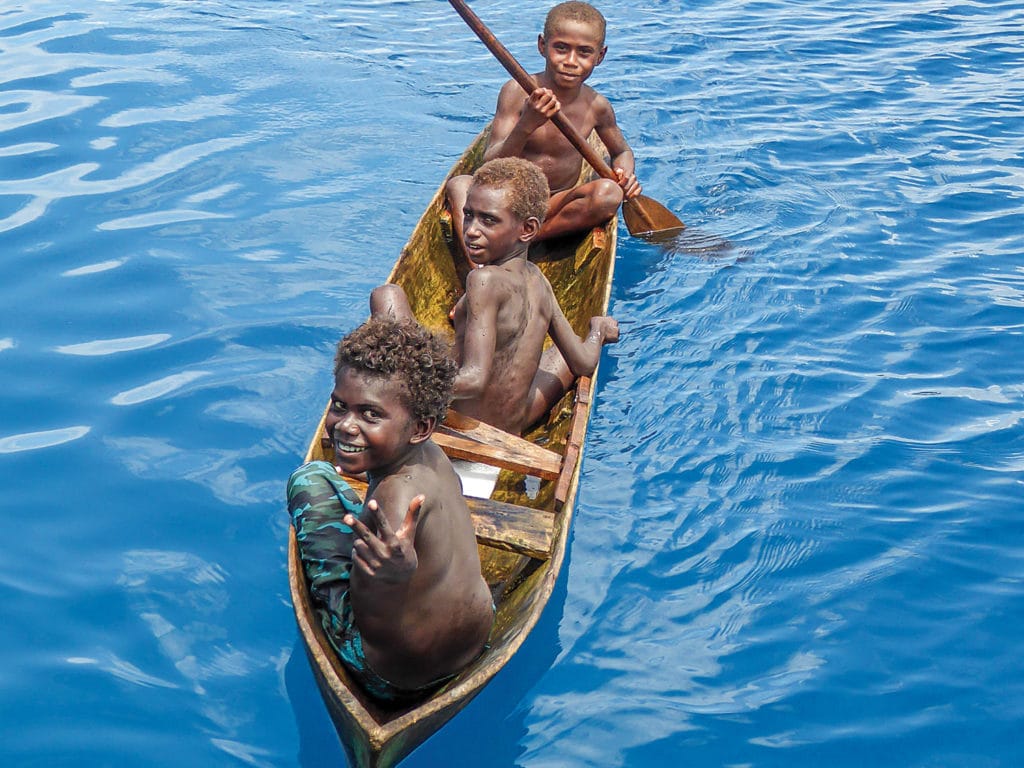
The fruit is bright green and fragrant, a few stems and leaves still attached. Limes grow wild throughout the islands, and these little girls saw us slowly motoring into the harbor and went to raid the nearest tree.
I pass over a $5 note and say thank you, either in pidgin (“Tank yu tu mas”) or in a local dialect, Roviana (“Lena hola”), which is spoken by most people in Western Province. My Roviana is almost always met with giggles of amazement. They sing a “thank you” in return and happily paddle away with a little pocket money, no doubt to buy lollies at the tiny local store.
Meeting them halfway to shore are three more canoes. The paddling slows, a few words are exchanged, and then the three continue to head our way with renewed vigor. The word is out: The yachties are open for business.
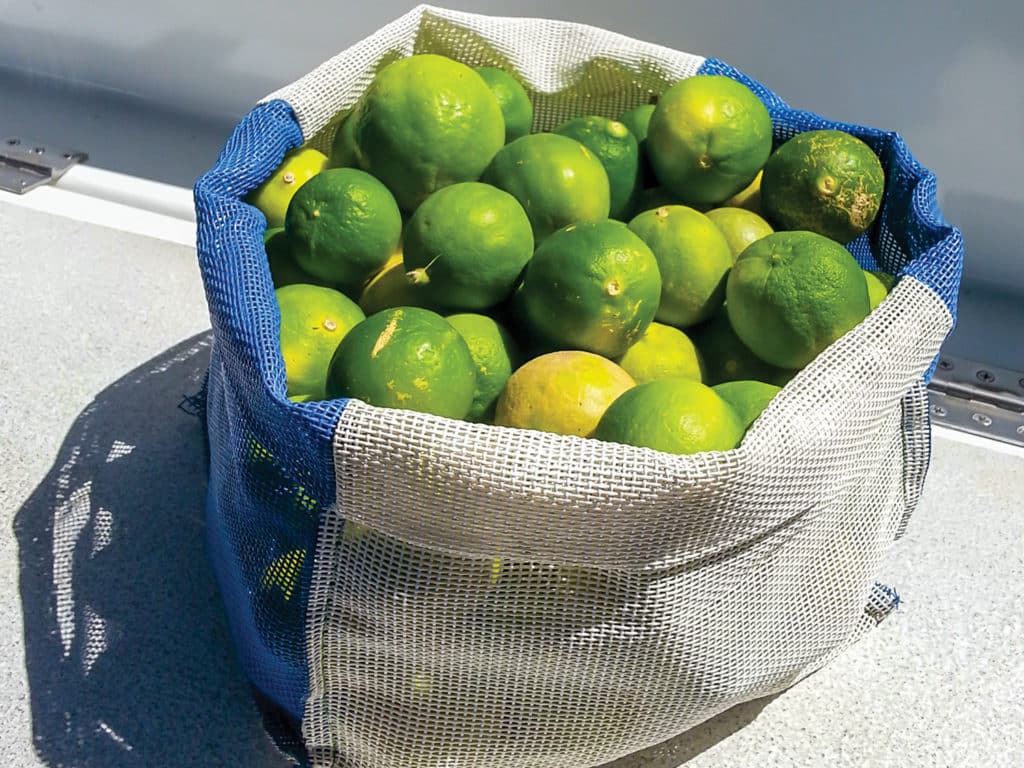
The “canoe kids” are at every village we stop at, and for months we have no need to find a town that hosts a market because all of our fruit and veggies come to us. Eggplants, local sweet potatoes, pineapples, guavas, capsicum, ginger, chilies, mushrooms, rambutans, tomatoes, beans, avocados, mangoes, pawpaws (papayas), pomelos and a variety of local spinachlike greens arrive via canoe. Occasionally we are presented with a few eggs, pale and small and probably stolen from one of the wandering chickens in the area. They are gingerly carried out in the folds of the paddler’s shorts as they sit cross-legged in their canoe.
In most villages, boys who are 8 to 10 years old are keen to take our requests for green coconuts. They paddle away to shimmy up a tree with their machetes, tools we see wielded with skill by even 6- and 7-year-olds. I hear the commotion in the forest nearby as the giant nuts fall through the trees and land with a sickening thud. A few moments later, the boys are back with a half-dozen neatly trimmed coconuts, ready to cut open and drink.
RELATED: You Can Go Back
When kids have multiple items to sell, I always ask them, “How mas all together?” encouraging them to do the math. The girls never seem to have troubles, but I have watched more than one boy wiggling fingers and then toes as he tallies the sale in his head.
Most of the exchanges are for money, but some of the teenagers want to trade: a T-shirt, a pair of shorts, a hat. A few kids ask for notebooks and pens for school. In villages quite far from a township, the young boys are keen on fishing line and hooks, and the girls light up when I offer elastics and barrettes for their hair. We carry extra salt, sugar, rice and tea—popular trade items everywhere we visit. But by far my favorite trade has been digital music files transferred to a memory card. It’s not because it costs us nothing other than time to do the transfer. It’s because I know there will be hours of enjoyment listening to the music, even if it is through the tinny speaker of a cheap mobile phone.
In one anchorage, the parade of canoes continues all afternoon. Most of the kids are little ones, ages 3 to 6. They arrive three or four in a canoe, cautious but curious; they have come both for the sale and the spectacle. Some run their hands down the hull of our Newport 41, Kate, like they are stroking a kitten—gently, lovingly, thoughtfully. Others stare at us with stony expressions, not too sure what to make of us “whitefellas,” maybe the first ones they’ve ever seen. Several show up more than once, hitching a ride in whatever canoe is heading our way. Almost everyone shows up with a bag of limes.
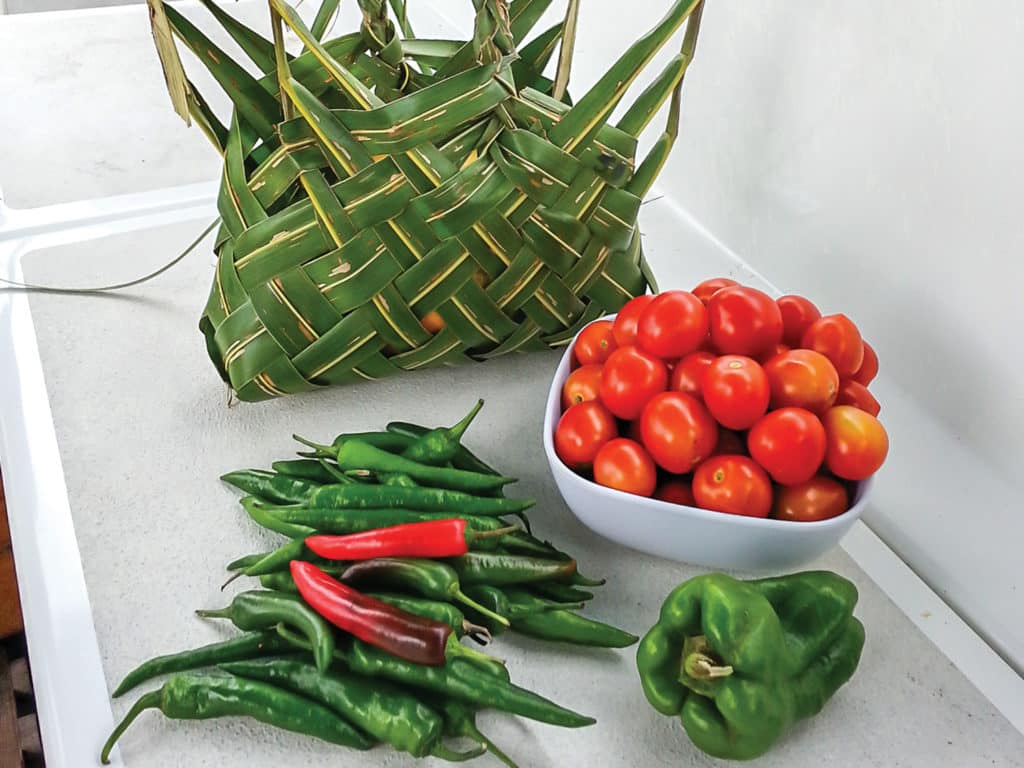
In one canoe, a girl of 5 presides over the two older boys with her. When they approach, she holds up an extra-large bag of limes, and smiles. She is dimpled, with skin the color of caramel and a head of soft curls. She hands over the bag and asks for $5. I tell her no. For a moment her face freezes, she can’t believe I have refused her. Leaning over the rail and weighing the bag in my hand, I say to them in pidgin, “Yufella bring STAKA limes; mefella tink $10, OK? (You guys brought a LOT of limes; I think $10 is fair, OK?”)” “YES!” she squeals, as I head below to get some money. I see her turn to her friends and laugh, clapping her hands like she was just told that Santa was on his way. When I hand her the money, she thanks me, and as the older boy paddles away, she turns to smile and wave. A few hours later, she returns with another paddler, another bag of limes and another smile. She leaves with another $5.
By midafternoon, we have more limes than we need, but I can’t help but buy every bag that is offered. It might not be much, but the children have made the effort to go out and pick the limes and paddle out to the boat. I am willing to spend a few extra dollars to reward their determination. At the end of the day, we have a huge basket brimming with well over 100 limes, probably more than we can use before they spoil.
The canoe kids come in canoes so leaky that we wonder how they stay afloat. They come with fruit in the scorching sun and with veggies in the pouring rain. They come with warm smiles and bright eyes and hope. And how can you say no to that?
Heather Francis is from Nova Scotia, Canada, and has worked and lived on boats since 2002. In 2008, she and her Aussie partner, Steve, bought Kate, a Newport 41, in California and have been sailing full time ever since. They are currently in the Philippines looking for wind. You can follow their adventures on their website (yachtkate.com).

